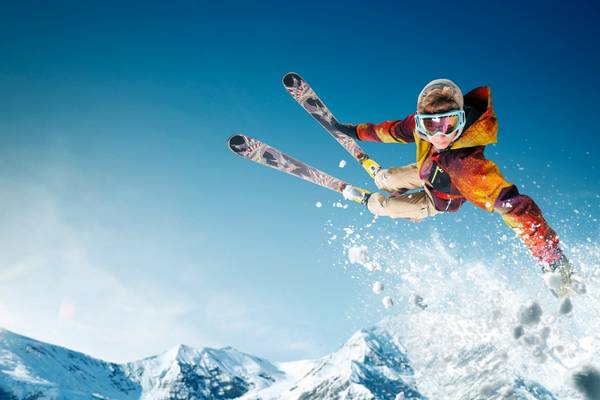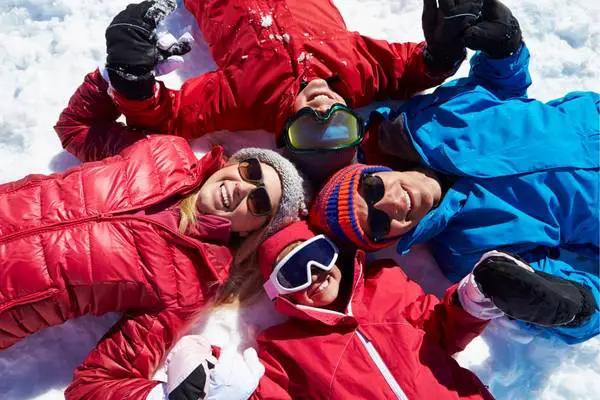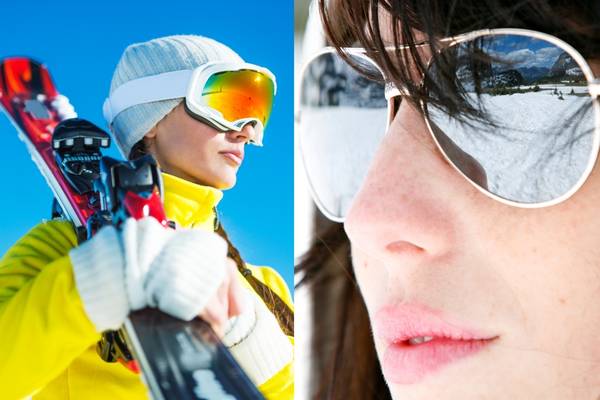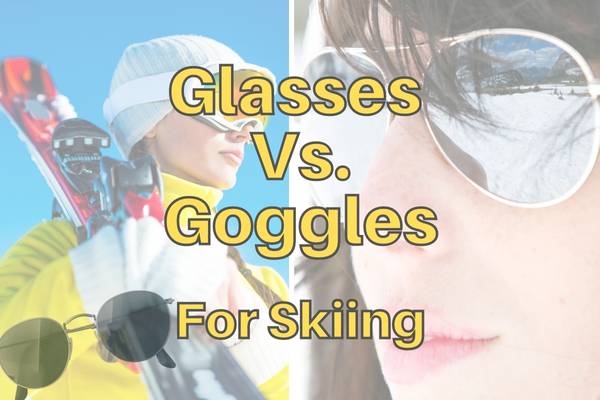When skiing down the snowy slopes, there will be strong light and sometimes fierce winds and cold that will be hard on your face and especially the eyes! Some people prefer full goggles, whereas others are fine with a pair of large sunglasses or normal prescription glasses.
Whether you can ski with glasses or sunglasses instead of goggles depends on factors such as the skier’s eyesight, the style of skiing, and the weather conditions. For beginners, I would recommend that skiers use goggles since glasses will not provide the same level of protection or visibility.
In my opinion, ski goggles are superior to sunglasses for a number of reasons. First, they protect against the UV light from the sun that is reflected in the snow. Second, they keep the wind out much better than sunglasses. Third, they protect against the cold due to the insulated rim. Fourth, ski goggles do not fall off so easily and can be fastened to your helmet. Fifth, ski goggles have a broader field of view allowing a better view of the slope.
Personally, I wear my normal glasses underneath my goggles, but this is not always super convenient!
Skiing at high speeds might be dangerous if you wear glasses since they fog up more quickly than goggles and tend to fall off. Goggles will provide a tighter seal around your eyes, protecting them from flying snow and debris and enhancing your field of vision on the mountain.
If you want to ski while wearing glasses, choose a comfortable pair designed for the sport.
Why do you need skiing goggles?
Skiing can be a dangerous sport. The high speeds and icy conditions can lead to serious injury, even death. That’s why it’s so important to wear proper safety gear when you ski, including a good pair of skiing goggles.
A good pair of skiing goggles will, first and foremost, allow you to see clearly while you are skiing. This is important so that you can avoid obstacles, such as trees, rocks, and other people! Ski goggles will also protect your eyes from wind, snow, and the UV radiation of the sun.

In addition to providing clear vision, skiing goggles will protect your eyes in the event of an accident. Ski goggles will protect your eyes from branches and rocks, which might otherwise cause serious injury to your eyes.
This is especially important if you are skiing off-piste in between the pine trees!
Skiing goggles protect your eyes from the bright sun and glare of the snow. They also help prevent wind and snow from getting into your eyes, which can cause irritation and even pain. And if you fall, skiing goggles can help protect your eyes from being scratched by ice or debris.
Why Do People Wear Sunglasses Instead Of Real Goggles For Skiing?
Because of the many advantages sunglasses have over ski goggles, they are often used in their place. Sunglasses and other light eyewear options are often chosen for their lightweight and more stylish looks as well as the convenience they provide. They also don’t fog up as quickly as goggles do.
Sunglasses are better than not wearing sunglasses because they protect the eyes of the user from the damaging sun’s harmful rays. They reduce glare while also protecting your eyes from potentially harmful ultraviolet rays.
Finally, most people would say that sunglasses provide a far higher level of fashion than goggles, which is probably the reason why most people wear them instead of full skiing goggles.

When you’re out on the hills with these, you won’t only look but also feel like a complete badass.
Wearing a beautiful pair of sunglasses rather than goggles in the mountains is a far better way to avoid seeming like a total nerd.
But… Skiing goggles, certainly have their merits as well!
Why should you choose ski goggles over sunglasses as a beginner?
Ski goggles can be seen as a kind of protective eyewear that skiers and those who participate in other types of winter activities often wear.
They are not just for show, but they protect your eyes from the brightness of the sun as well as the cold that is caused by the wind.
Ski goggles protect the wearer’s eyes from the heavy wind, snow, and ice, which ordinary sunglasses do not!
This is especially important as a beginner on the slopes, as there are plenty of other things to think about than wind and snow in your eyes!
However, as you grow older, you may find that wearing sunglasses instead of ski goggles is nicer and provides you a bit more freedom, but I would definitely recommend beginners to use goggles.
To summarize, skiing goggles are great because they:
- Protect against the UV light from the sun reflected in the snow.
- Keeps the wind out much better than sunglasses.
- Protects against the cold due to the insulated rim.
- Ski goggles do not fall off so easily and can be fastened to your helmet.
- Ski goggles have a broader field of view allowing a better view of the slope.
On the other hand, sunglasses win on these parameters:
- They are lightweight and easy to carry when not needed.
- Some people find them cooler than bulky skiing goggles.
- They are often less expensive, especially with prescriptions!
- More models to choose from. More customizable.
- Sunglasses are not just for skiing, but can be used in the summer as well (more money saved!)
I will go into more detail for each of these points below.

1) Protection against UV light:
When you are on the slope, UV radiation can penetrate clouds and reflect from the snow. UV radiation from the sun is very dangerous, especially to the eyes.
Snow can reflect just as much UV light as is coming from a clear sky, which is why it is highly recommended to wear sunglasses or goggles to protect yourself against snow blindness, or photokeratitis, or even snow blindness in your eye.
2) Protection against the wind:
Cold wind is just annoying and can push snow particles into your eyes. The closer the eye-glasses or sunglasses sit to your eyes, the easier it is for the wind to get inside. This is why sunglasses and ski goggles have different designs.
3) Protection against the cold:
Having the wind blow into your eyes is uncomfortable, but what if it was actually cold too?! Ski goggles are often completely insulated and have a rim around the eyes. If you put them on, you can feel how the rim presses against your cheeks creating a nice warm space around your eyes.
The wind can no longer blow cold directly into your eyes.
4) They stay attached to your head:
Glasses can fall off very easily, but if you wear your ski goggles correctly, they will stay attached to your head.
The straps of ski goggles are designed to fit around the helmet so that they will not fly off if you crash, like sunglasses tend to do. They are fastened to the helmet by either clip ons or by a plastic strap that loops through the helmet, making them even easier to wear.
Ski goggles are also made with a rubber-foam grip that clings to your face, so they won’t come off easily.
5) They provide a wider field of view:
Ski goggles are made for sports. You can provide a much wider field of view with them and even have glasses polarized to provide even more protection.
The broader field of view of ski goggles allows you to have a slightly bigger view in front of you. This makes it easier to see upcoming obstacles in the snow or other skiers from behind!
There are several different models of ski goggles, each with a unique set of characteristics.
There are two primary varieties of ski goggles available:
Those with no or a light frame, which provides a more expansive field of vision, and those that include a frame, which may make it easier to keep the sunglasses in place on the wearer’s head.
Some ski goggles feature polarized lenses, which help reduce glare, while others include photochromic lenses, which darken automatically when exposed to intense light!
When determining whether or not you need ski goggles, there are a few factors that should be taken into consideration.
- Do you need protection from the wind?
- Will it be very cold or not?
- Is the snow going to be hard or soft?
- Will it be sunny most of the time or cloudy?
- Will the UV index be high or low?
When skiing during the day, it is suggested that you wear ski goggles to protect your eyes from the harmful effects of the sun’s ultraviolet radiation.
When skiing in colder conditions, wearing ski goggles may help protect your eyes from the snow and wind flying about. When skiing in hard or icy circumstances, ski goggles are essential for preventing snow and ice from entering the eyes.
This is particularly important for those who have sensitive eyes.
Can You Ski With Sunglasses Only?
Yes, sure, but you will miss out on some perks in extreme conditions!
Is it feasible to ski with only a pair of sunglasses, despite sunglasses being required for every day spent on the slopes? The appropriate answer is yes, but with a few essential qualifications.
First, check whether your sunglasses are too oversized for your face by holding them up in front of a mirror.

It would help if you tried to keep them from falling down your face every time you turn. Second, choose a pair of sunglasses that is a bit sturdy as they should not blow off in the wind.
You will wear glasses to protect your eyes from the glare of the sun and the snow, so make sure they sit fairly close to your face. Although do not expect them to be as tight as proper skiing goggles.
Normal glasses or sunglasses do, however, not easily strap to your helmet as you do with goggles, but they will usually be secured due to the helmet keeping the rods that go around your ears in place.
Last but not least, remember that sunglasses alone aren’t enough to shield your eyes from the sun’s rays if you’re outside in the snow.
This is because the sun will be reflected on the surface of the snow and therefore also enters from underneath your glasses. There are however some types of sunglasses that allow for a tight closure below your eyes as well.
But also remember that before going out skiing for a day, apply sunscreen to your face and lips. This is not always needed if you have large sunglasses and a good winter jacket with a high neck!
However, some skiers insist that sunglasses are all they need. Those who were using sunglasses claim that they are adequately protected from the weather and have no trouble seeing.
Make sure your sunglasses fit correctly and provide enough protection from the sun if you want to ski in just them. The weather on the slopes will likely be chilly, windy, and snowy, so dress accordingly.
Can you wear glasses under ski goggles?
Yes, glasses can be worn under ski goggles and I know many skiers who do so (including myself!).
However, you should make sure that your ski goggles can fit over your glasses before purchasing a pair.
So, wearing glasses under ski goggles can be a bit of a challenge, but it is possible. Here are a few tips to follow:
- Make sure your glasses fit well before heading out on the slopes. They should not be too loose or too tight.
- Put your glasses on first and then carefully put your goggles over them.
- Tighten the straps on your goggles so that they fit snugly against your face, without squeezing your glasses into your eyes! This will help keep the glasses in place.
- Make sure both goggles and glasses are cleaned before use as double-dirty is not so nice and very hard to fix on the slope… Talking from experience here!
With a little bit of effort, you can successfully wear glasses under ski goggles and enjoy a great day on the slopes!
If you wear prescription glasses, it is best to purchase a pair that can accommodate your skiing goggles. Otherwise, you may risk damaging your glasses during impacts.
Personally, I use these skiing goggles because they easily fit over my glasses and have exchangeable lenses!
Conclusion
Skiing is a great winter activity that can be enjoyed by people of all ages. Whether you’re a beginner or an experienced skier, it’s important to dress for the conditions and protect your eyes from the sun and the snow.
Sunglasses are a great option for those who want to avoid the hassle of goggles, but it’s important to choose a pair that fits well and provides adequate protection.
They are a valid option for skiing in warmer and less windy climates, but they have some disadvantages in colder more harsh weather.
They don’t provide as much protection from the cold and wind as goggles do, and they can fog up more easily. If you choose to ski in sunglasses, make sure they fit well and provide adequate UV protection.






